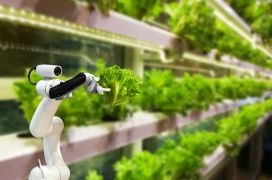Sky-high expectations for vertical agriculture

source: FoodPro Network International
AMSTERDAM - For years, organisations are experimenting with vertical agriculture. Crops are grown on top of each other in buildings, for example in factory halls, offices or in farm towers. Vertical farming has many advantages. As crops are grown in a fully controlled environment, no pesticides are needed. The use of water and fertilizer is very efficient and accurate. Because it is possible to produce within a city, the food print is reduced and the pressure on existing farmland decreases. In addition, this interior farming is not subject to the vagaries of nature, such as drought or floods.
Of course, there are also disadvantages. This is why vertical agriculture has not yet become commonplace, despite promising year-on-year growth rates of more than 25%. First of all, the high energy consumption is necessary to create the ideal growing environment for the crops. Furthermore, there are major investments involved in the design of this 'urban agriculture' and the production costs are high. Also, not every crop can be grown indoors with equal success. Leafy vegetables, herbs, tomatoes and strawberries seem to thrive in such a controlled environment, while crops such as wheat and potatoes are much more difficult to grow.
The FAO expects 70% of the world's population to live in cities by 2050. To what extent the recent COVID-19 pandemic will affect these figures is the question, now that the concept of 'space' and 'qualitative living environment' have taken on a new dimension for many. But overall this figure will be correct. Food security and constant supplies of food are extremely important. For corona, we were barely aware of this. The supermarkets were full of all kinds of food that we needed and often didn't need. But the tide has turned. As a world, we are pressed on the facts; we have less control over our lives than we thought. And that also applies to the basic necessity of our daily food. In the Netherlands we have little to fear, we can meet this need for food and even have a food surplus that we export. But in other countries this situation is very different, where people depend on food imports. This gives a direct boost to the development of vertical agriculture. Urban agriculture seems to have a future, as it answers important issues such as food security, scarce resources, food price inflation and sustainability. These prospects attract investors, who will further increase the already high growth expectations. The lettuce plants grown indoors will grow to the sky.
TEN the export network offers advice and support to food & beverage companies that dare to look across borders. We coordinate export activities, stimulate business development projects and set up new international routes. TEN professionalizes existing export activities and we are consultants working for the SIB program (Starters International Business Program of the RVO, Dutch Government) for SME companies. For more information: www.theexportnetwork.nl or contact us for an appointment: http://www.theexportnetwork.nl/contact/.
Latest news
-
11 jan Nestlé Vietnam invests $100 million in coffee factory to meet growing consumer demand
-
11 jan TraceGains' Together Conference 2024
-
11 dec Alex Holt appointed Chief Sustainability Officer of Ahold Delhaize
-
29 nov Nestlé develops N3 milk with new nutritional benefits, launches first in China
-
21 nov Grocery shopping in Australia
-
20 nov Centuries-old-fermentation technique all hot again
-
12 sep The limits of exports
-
18 aug Detecting and Preventing Coffee Fraud
-
14 aug Connecting the world of food professionals
-
10 aug Sky-high expectations for vertical agriculture
Join the conversation
Are you already a member? Please
Login
Don't have an account yet? Please register